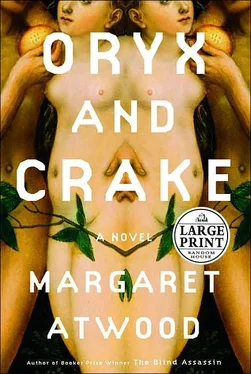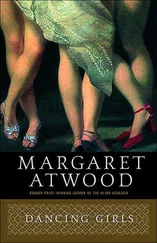One day a man came to the village. It was the same man who always came. Usually he arrived in a car, bumping over the dirt track, but this time there had been a lot of rain and the road was too muddy. Each village had its own such man, who would make the dangerous journey from the city at irregular intervals, although it was always known ahead of time that he was on his way.
“What city?” asked Jimmy.
But Oryx only smiled. Talking about this made her hungry, she said. Why didn’t sweet Jimmy phone out for some pizza? Mushrooms, artichoke hearts, anchovies, no pepperoni. “You want some too?” she said.
“No,” said Jimmy. “Why won’t you tell me?”
“Why do you care?” said Oryx. “I don’t care. I never think about it. It’s long ago now.”
This man—said Oryx, contemplating the pizza as if it were a jigsaw puzzle, then picking off the mushrooms, which she liked to eat first—would have two other men with him, who were his servants and who carried rifles to fend off the bandits. He wore expensive clothes, and except for the mud and dust—everyone got muddy and dusty on the way to the village—he was clean and well-kempt. He had a watch, a shiny gold-coloured watch he consulted often, pulling up his sleeve to display it; this watch was reassuring, a badge of quality. Maybe the watch was real gold. There were some who said it was.
This man wasn’t regarded as a criminal of any sort, but as an honourable businessman who didn’t cheat, or not much, and who paid in cash. Therefore he was treated with respect and shown hospitality, because no one in the village wanted to get on his bad side. What if he ceased to visit? What if a family needed to sell a child and he would not buy it because he’d been offended on a previous visit? He was the villagers’ bank, their insurance policy, their kind rich uncle, their only charm against bad luck. And he had been needed more and more often, because the weather had become so strange and could no longer be predicted—too much rain or not enough, too much wind, too much heat—and the crops were suffering.
The man smiled a lot, greeted many of the village men by name. He always gave a little speech, the same one every time. He wanted everyone to be happy, he would say. He wanted satisfaction on both sides. He didn’t want any hard feelings. Hadn’t he bent over backwards for them, taking children that were plain and stupid and a burden on his hands, just to oblige them? If they had any criticism of the way he conducted affairs, they should tell him. But there was never any criticism, though there was grumbling behind his back: he never paid any more than he had to, it was said. He was admired for this, however: it showed he was good at his trade, and the children would be in competent hands.
Each time the gold-wristwatch man came to the village he would take several children away with him, to sell flowers to tourists on the city streets. The work was easy and the children would be well treated, he assured the mothers: he wasn’t a low-down thug or a liar, he wasn’t a pimp. They would be well fed and given a safe place to sleep, they would be carefully guarded, and they would be paid a sum of money, which they could send home to their families, or not, whatever they chose. This sum would be a percentage of their earnings minus the expense of their room and board. (No money was ever sent to the village. Everyone knew it would not be.) In exchange for the child apprentice, he would give the fathers, or else the widowed mothers, a good price, or what he said was a good price; and it was a decent-enough price, considering what people were used to. With this money, the mothers who sold their children would be able to give the remaining children a better chance in life. So they told one another.
Jimmy was outraged by this the first time he heard about it. That was in the days of his outrage. Also in the days of his making a fool of himself over anything concerning Oryx.
“You don’t understand,” said Oryx. She was still eating the pizza in bed; with that she was having a Coke, and a side of fries. She’d finished with the mushrooms and now she was eating the artichoke hearts. She never ate the crust. She said it made her feel very rich to throw away food. “Many people did it. It was the custom.”
“An asshole custom,” said Jimmy. He was sitting on a chair beside the bed, watching her pink cat’s tongue as she licked her fingers.
“Jimmy, you are bad, don’t swear. You want a pepperoni? You didn’t order them but they put them on anyway. I guess they heard you wrong.”
“ Asshole isn’t swearing, it’s only graphic description.”
“Well, I don’t think you should say it.” She was eating the anchovies now: she always saved them till last.
“I’d like to kill this guy.”
“What guy? You want this Coke? I can’t finish it.”
“The guy you just told me about.”
“Oh Jimmy, you would like it better maybe if we all starved to death?” said Oryx, with her small rippling laugh. This was the laugh he feared most from her, because it disguised amused contempt. It chilled him: a cold breeze on a moonlit lake.
Of course he’d marched his outrage off to Crake. He’d whammed the furniture: those were his furniture-whamming days. What Crake had to say was this: “Jimmy, look at it realistically. You can’t couple a minimum access to food with an expanding population indefinitely. Homo sapiens doesn’t seem able to cut himself off at the supply end. He’s one of the few species that doesn’t limit reproduction in the face of dwindling resources. In other words—and up to a point, of course—the less we eat, the more we fuck.”
“How do you account for that?” said Jimmy.
“Imagination,” said Crake. “Men can imagine their own deaths, they can see them coming, and the mere thought of impending death acts like an aphrodisiac. A dog or a rabbit doesn’t behave like that. Take birds—in a lean season they cut down on the eggs, or they won’t mate at all. They put their energy into staying alive themselves until times get better. But human beings hope they can stick their souls into someone else, some new version of themselves, and live on forever.”
“As a species we’re doomed by hope, then?”
“You could call it hope. That, or desperation.”
“But we’re doomed without hope, as well,” said Jimmy.
“Only as individuals,” said Crake cheerfully.
“Well, it sucks.”
“Jimmy, grow up.”
Crake wasn’t the first person who’d ever said that to Jimmy.
The wristwatch man would stay overnight in the village with his two servants and their guns, and would eat and then drink with the men. He would hand out cigarettes, entire packs of them, in gold and silver paper boxes with the cellophane still on. In the morning he would look over the children on offer and ask some questions about them—had they been sick, were they obedient? And he’d check their teeth. They had to have good teeth, he said, because they would need to smile a lot. Then he would make his selections, and the money would change hands, and he’d say his farewells, and there would be polite nods and bows all round. He would take three or four children with him, never more; that was the number he could manage. This meant he could pick the best of the crop. He did the same in the other villages in his territory. He was known for his taste and judgment.
Oryx said it must have been too bad for a child not to be chosen. Things would be worse for it in the village then, it would lose value, it would be given less to eat. She herself had been chosen first of all.
Sometimes the mothers would cry, and also the children, but the mothers would tell the children that what they were doing was good, they were helping their families, and they should go with the man and do everything he told them. The mothers said that after the children had worked in the city for a while and things were better, then they could come back to the village. (No children ever came back.)
Читать дальше












